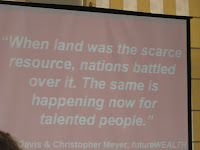Consultants Learn to Weather Bad Economic Times

“Quite simply, they need work and don’t have any”. “They’re considering returning to full-time job employment because their business is nonexistent right now,”
“I think a lot of sole practitioners are hurting in this economy,”
While employers are cutting back and closely monitoring operations, there is a strong trend toward companies investing in programs that assist in hiring/retention efforts.
Roberta Chinksy Matuson, an HR consultant in the Boston area, agrees. “In any economy there are opportunities,” she says. In the past three months she notes that she has had more phone calls for business than over the entire year. “I see this as an opportunity to really propel my organization forward, while others are pulling back,” she says.
Kevin Nussbaum, SPHR, is president of CBIZ Human Capital Services. “We’ve been doing well this year, but I would say our product mix has changed and our focus has changed,” he says.
“Downtimes for business do not correlate to downtimes for HR consultants,” says Jonathan Kroner, J.D., MBA, a Miami-based attorney that works with HR professionals to help avoid litigation. “Opportunities arise to plan and administer layoffs, buyouts, staff reductions, benefit modifications—these all involve HR functions,” he notes.
Individual HR consultants will have different experiences, agrees Regan. “It depends upon what the HR consultant’s area of expertise is. If it’s outsourcing or downsizing, business is booming. For most independent HR consultants, though, their business will decline as businesses reel in their expenses. Many companies still need to have the work done—they’re simply postponing projects until the economy begins to rebound,” he says. “And, it will in time,” he notes.
Outsourcing More Viable than Ever
Despite the slowing economy, outsourcing remains a viable option for many organizations, representing opportunities for HR consultants.
“If you stop and think about what is affected in companies the most right now, it’s the people,” Carvin points out. “So, in an economic change of any kind, whether we go into a huge boom or a huge bust, people are affected. And, who is responsible for the people function of a company— that’s HR, whether internal or external,” says Carvin. “HR people, in my opinion, become more critical at this stage of the game than ever,” she says.
In today’s culture of do more with less, firms are still outsourcing for three reasons,
—time, money and retention:
- Time. The recent turn of the economy has not only been shown by the number of layoffs, but also with the increased workload burden for employees who made the cut. In a department of 60 where 20 were laid off there are simply not enough hours in the day for the remaining 40 to pick up the slack, says Espuga.
- Money. It is more economical to hire professionals temporarily than to spend the firm’s dollars on salaried employees with benefits, who are not contractually obligated to finish projects, she says.
- Retention. Since uncertain times send employees’ morale plummeting, now more than ever it is critical to keep turnover low by keepng current employees satisfied, says Espuga. HR consultants can certainly play a role here.
Carvin agrees. “We’re seeing that a lot of HR departments are running with shorter staffs and are swamped with work so they often need to turn to some outside expertise,” she says.
HR consultants that can carve out a special niche that represents value for their clients will also survive—even thrive—in this economy.
“It is my professional opinion that this is an excellent time for HR consultants—just not the traditional kind,” says Jim VanNest, a consultant who recently made the switch from being an HR director inside an organization to starting his own HR consultants/staffing group. VanNest is hoping to ride that wave through the services provided by his company, Second Watch Associations. He says he sees some key dynamics in the environment that are driving new demand:
- The decentralization of work task assignments into separate organizations that form working units on a project basis. This was foretold in 1991 by Robert Reich in The Work of Nations, VanNest points out.
- The decline in participation and the eventual exit of Baby Boomers from the full-time workforce, leaving behind tasks for which there are no replacements, or untrained or lightly trained replacements even when available.
- The movement from bricks and mortar companies to virtual companies.
“When we add the latest dynamic that shows that many currently operating medium and larger businesses are in debt or bordering on bankruptcy, the opportunities for smaller companies that do not have as much expensive overhead or as extensive debts expand even more,”
Emphasizing Value
A tight economy in which many HR consultants are competing for the same clients makes bidding competition more intense. “Because of fewer contracts being offered in the marketplace, HR consultants will need to become more competitive in pricing proposals and add extra value as a bonus,”
“You have to prove cost/benefit these days whether that involves an eligibility audit on their health plan to providing proven sales-force effectiveness or top-grading the sales force—these are all issues that people are struggling with and you’re going to sell those projects at the CEO/CFO level, typically,”
In fact, the area of evaluating and improving sales-force effectiveness is one that Nussbaum says he is surprised has not become more prevalent among HR consultants.
“There’s no better way for HR to demonstrate return on investment than to improve the sales force,” he says.
To conclude there are three pieces of advice to HR consultants in this economy:
- Accelerate your marketing.
- Continue to network.
- Turn off all of the gloom and doom.
“You can use the economy as an excuse for everything and you can be paralyzed and just sit in front of your computer all day watching your portfolio—or you can take action,” she says. “This is the time for HR consultants to really show organizations the value they bring.”
Francis Jeyaraj
Appoline Global HRD Consulting Group

Comments